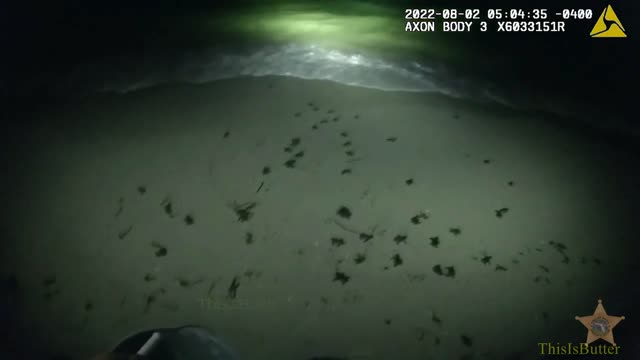Premium Only Content

Pinellas deputies rescue lost sea turtle hatchlings found wandering at St. Pete Beach hotel property
Several Pinellas deputies came to the rescue of sea turtle hatchlings that had gotten lost while trying to find their way to the Gulf – and instead wandered onto the property of a St. Pete Beach hotel.
The Pinellas County Sheriff's Office said a sergeant and two deputies responded to a call before 5 a.m. Tuesday morning from a hotel security guard, who had found over a dozen baby sea turtles throughout the property before calling the sheriff's office for help.
When the deputies arrived, they found that the guard had collected about 15 of the hatchlings on his own. They then spread out and found baby sea turtles all over the area, including in the hotel's pool, in the bushes, in the bathroom, and even in the storm drain, the agency said.
The sergeant contacted an officer with the Florida Fish and Wildlife Conservation Commission, who instructed her to release the turtles at the water's edge and let them go toward the Gulf water on their own.
Body camera video showed the turtle release, where the deputies shined their flashlights onto the shoreline to encourage the hatchlings to head the right way as dozens of the tiny turtles could be seen making their way to the water.
"With some words of encouragement and guidance all the hatchlings made their way to the water successfully," the sheriff's office said.
"Normally they would go toward the water with the moonlight reflecting off, that’s kind of their beacon," said veterinarian Shelly Marquardt with Clearwater Marine Aquarium. "With all of our streetlights and all of our hotel lights and all of our urban areas, unfortunately, that can be a distracter to them. So when they see that light, they get confused."
Only one in 1,000 sea turtles survive to become adults. Florida Fish and Wildlife said artificial lighting leads to thousands of sea turtle deaths in Florida.
"Disorientation actually happens a lot. We have many, many reports this year, unfortunately. The more than humans are coming into their habitat, and we’re co-mingling, the prevalence of this increases," Marquardt said.
-
 LIVE
LIVE
JuicyJohns
2 hours ago $2.89 earned🟢#1 REBIRTH PLAYER 10.2+ KD🟢
91 watching -
 3:18:50
3:18:50
Times Now World
4 hours agoLIVE: NATO Chief Demands 5% of GDP for War Chest! Mark’s Bold Plan for Allies at IISS Prague Defence
20.2K1 -
 15:54
15:54
IsaacButterfield
5 hours ago $0.36 earnedAustralians BANNED from Taking Photos at Uluru
4.35K7 -
 LIVE
LIVE
The Mike Schwartz Show
1 hour agoTHE MIKE SCHWARTZ SHOW with DR. MICHAEL J SCHWARTZ 09-04-2025
4,112 watching -
 LIVE
LIVE
LFA TV
3 hours agoLFA TV ALL DAY STREAM - THURSDAY 9/4/25
4,163 watching -
 1:16:35
1:16:35
JULIE GREEN MINISTRIES
4 hours agoGOVERNMENTS AROUND THE WORLD ARE ABOUT TO COLLAPSE
81K138 -
 1:54:16
1:54:16
Welcome to the Rebellion Podcast
14 hours ago $1.88 earnedDon3po is Live - WTTR Podcast Live 9/4
16.7K2 -
 13:43
13:43
The Kevin Trudeau Show Limitless
1 day agoClassified File 3 | Kevin Trudeau EXPOSES Secret Society Brainwave Training
65.2K10 -
 1:59:20
1:59:20
The Chris Salcedo Show
14 hours ago $3.29 earnedAmericans Are Tired Of Leftists & Fake-GOP Who Cater To Them
22.3K -
 1:12:23
1:12:23
Game On!
21 hours ago $1.58 earnedFootball IS BACK! Cowboys vs Eagles Opening Night Kickoff!
19.1K1